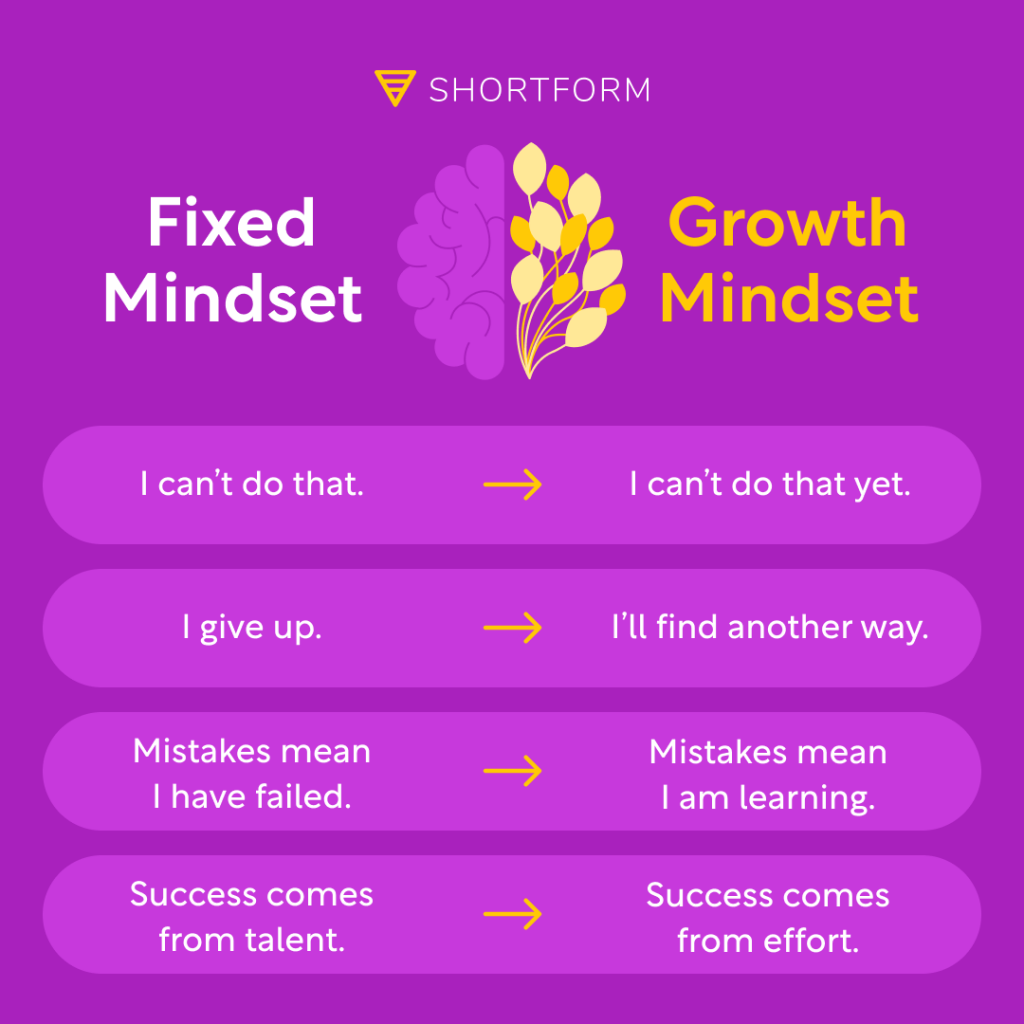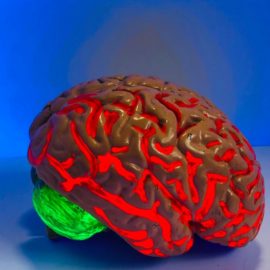

This article gives you a glimpse of what you can learn with Shortform. Shortform has the world’s best guides to 1000+ nonfiction books, plus other resources to help you accelerate your learning.
Want to learn faster and get smarter? Sign up for a free trial here .
What’s the difference between a fixed and a growth mindset? Why are growth mindsets beneficial? How can you develop one?
A fixed mindset is when you believe you’re abilities are unchangeable, while a growth mindset is the belief that you can improve your abilities with hard work. A fixed mindset will hold you back in life while a growth mindset opens you up to infinite possibilities.
Here’s an in-depth look at the difference between a fixed vs. growth mindset, an infographic, and actionable tips.
The Difference Between a Fixed vs. Growth Mindset
Here is a fixed vs. growth mindset infographic to help you visualize the differences as we discuss them below.

When you have a fixed mindset, you believe your abilities are unchangeable. You were born with certain traits and a certain amount of intelligence and that’s that. Many people are trained in this mindset from an early age—for instance, by a teacher who believed your IQ determines everything: You’re either smart or you’re not, and you can learn or you can’t.
When you view your abilities as unchangeable, you feel you must constantly prove yourself. If people get only a set amount of intelligence and a certain character, you want to prove you have a lot, although you secretly worry you were shortchanged. You don’t want to look unintelligent or fail. You feel you’re being judged or rated in every situation and must measure up. Children inculcated with this mindset often fear losing their parents’ or teachers’ approval and love if they fail.
When you have a growth mindset, you believe the abilities you’re born with are a starting point you can build on with hard work, persistence, and the right learning strategies. You have a passion for learning, welcome mistakes as opportunities to learn, and seek challenges so you can stretch. You also have a greater ability to survive difficult times.
- To illustrate this difference, imagine a child learning to ride a bike and falling repeatedly. If the child has a fixed mindset, they might say, “I’m just bad at this,” and accept their fate. They see bike riding ability as a fixed trait, which means trying to improve seems as futile as trying to get taller.
- On the other hand, a child with a growth mindset might be discouraged if they fall repeatedly, but they would see it as an opportunity to improve. Instead of thinking, “I’m just bad at this,” they’re more likely to think, “I still don’t understand this, so I should keep working on it.” They believe their effort is meaningful, so they keep trying (and therefore keep improving).
Believing in the ability to learn and grow doesn’t mean believing anyone can become an Einstein or believing anyone can do anything they aspire to if they apply enough effort. But the growth mindset recognizes that you can’t predict someone’s potential or how far their passion, work, and learning can take them.
Tips for Developing a Growth Mindset
- First, acknowledge and accept your fixed mindset. Most people call on both mindsets in different scenarios, so having a predominantly fixed mindset doesn’t make you a bad or inferior person. It’s just another way of thinking, and if you want to develop a growth mindset, you absolutely can. In other words, avoid having a fixed mindset about having a fixed mindset.
- Next, take note of the situations that trigger your fixed mindset. For example, you might notice yourself slipping into a fixed mindset when you’re overwhelmed by a demanding task or when a colleague gets promoted over you.
- Think of your fixed mindset as a separate persona and give it a name. That way, when you catch yourself thinking, “I should give up; I’m just not talented at this,” you can say, “Oh, that’s just Rigid Rita acting up.” Assigning those thoughts to a separate persona will help you remember that you don’t have to believe those fixed-mindset thoughts; you can choose to respond with a growth mindset instead.
- Finally, when you notice your fixed mindset persona taking over, confront it directly. Remind that persona that you are capable of growth and that risk and effort are necessary parts of that.

Want to fast-track your learning? With Shortform, you’ll gain insights you won't find anywhere else .
Here's what you’ll get when you sign up for Shortform :
- Complicated ideas explained in simple and concise ways
- Smart analysis that connects what you’re reading to other key concepts
- Writing with zero fluff because we know how important your time is






